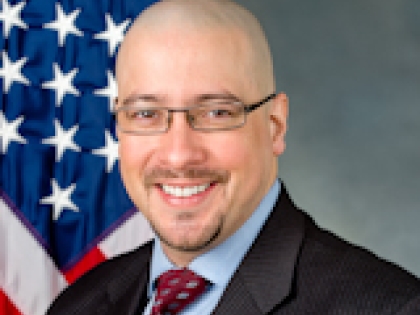
'Don't Shoot New York' Rally in Times Square Targets Gun Violence
By Catherine Yang - Epoch Times
NEW YORK—Local politicians and anti-violence advocates marched from the United Nations to Times Square on Sunday to participate in the “Don't Shoot New York” march and rally, presented by Operation SNUG. State senators Malcolm Smith and Gustavo Rivera, and Assembly members Grace Meng, Brian Kavanagh, and David Weprin joined the event.
“Gun violence affects us all—white or black, rich or poor. Illegal guns terrorize neighborhoods and tear apart families,” Smith said. “Our children are dying at the hands of gun violence, but through our commitment to SNUG, we can put a stop to that deadly trend now and return our streets to their rightful owners, the people of New York.”
Operation SNUG (“guns” spelled backward) is a state-wide initiative that received a $4 million state grant during the 2009-2010 fiscal year to create safer communities by curbing gun violence. The program was based on CeaseFire Chicago, a public health strategy that, according to the Department of Justice, reduced shootings in the targeted areas by 16 to 35 percent and helped 85 to 99 percent of the high-risk clients obtain jobs, education, and drug treatment.
There are currently 10 SNUG programs throughout New York—in Albany, Brooklyn, Buffalo, Manhattan, Mt. Vernon, Niagara Falls, Queens, Rochester, Syracuse, and Yonkers—all of which had at least one representative present at the rally. While all programs differ slightly in their methods, all of them are emulating the CeaseFire Chicago’s model.
“I have about eight outreach workers and violence interrupters, and so they go out into the streets of Harlem and try to get to the higher-risk individuals who are likely to be shooters or likely to be shot,” said Robin Holmes, project director of New York City Mission Society, the Manhattan SNUG program centered in Harlem.
Holmes says that if someone is shot, the outreach workers are the ones that go to the hospitals with the victims and mediate the conflicts to prevent retaliation.
“We’ve been losing the lives of too many people in our communities, and we know why that is. Something violent happens, someone does something terrible with a gun or a knife, and that incident leads to another violent incident, and another one after that, and another one after that,” Assemblyman Kavanagh said. “Sometimes it seems like there’s nothing we can do about that, sometimes it seems like the cycle just continues and continues and continues. But what we’re seeing here today is the fact that SNUG has gotten into some of those communities, and it has stopped that cycle.”
The SNUG programs are concentrated in areas with high numbers of shootings.
“The outreach workers have to carry a case load of 15 or better,” Holmes said. The workers try to support the clients and explain that there are ways to resolve conflicts without resorting to violence. The program in Harlem has also been visiting various schools and speaking to students about resolving conflicts peacefully.
Manhattan received funding for Operation SNUG last October, and hiring began in January.
Holmes explained that having an outreach program like this can produce better results than putting in place additional law enforcement, because the workers have a similar history to and are living in the same neighborhood as the high-risk clients.
“These are credible messengers because they have similar backgrounds to the children they’re trying to reach,” Holmes said. “We call them credible messengers because they have the credibility—people know them, people trust them—and so with that, they have the opportunity to get the information they need, so they can stop any retaliation issues. It’s so territorial now.”
Holmes added that SNUG employees work with the law enforcement in that they receive information about reported shootings; however, they are not giving information to the police in return, because that would diminish the credibility and effectiveness of the outreach program.
“We’re really trying to educate and mobilize the community,” Holmes said.
State Sen. Rivera has been pushing for the program to be implemented in the Bronx as well.
“Just last week we were doing a press conference announcing this march, and while I was in Albany announcing this march, a 16-year-old young man was shot and killed in my district,” Rivera said. “Last year a lady told me that just two floors down [from her] someone had been shot in their home. And everybody in that neighborhood knew who it was [and] knew why it happened, and nobody spoke. Tragedies like that are why SNUG is so important, because what it does is provide options. It gives our young people options, and it says to them [that] there are other ways to resolve problems.”